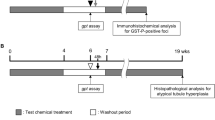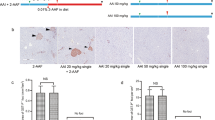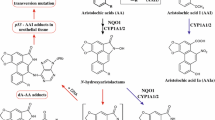Abstract
p-Dichlorobenzene (pDCB) is a male rat kidney carcinogen believed to act through α2u-globulin nephropathy. Recent data on metabolism, however, suggest a potential for generating oxidative stress. To examine possible mechanisms of kidney carcinogenesis, pDCB was studied for ability to produce 8-oxodeoxyguanosine (8-oxodG) in kidney nuclear DNA and for initiating activity in a two-stage renal carcinogenesis model. F344 male rats were given pDCB by intragastric instillation, 5 days/week for 13 weeks at 300 mg/kg per day, which is a carcinogenic dose with chronic administration. To assess initiation after exposure, trisodium nitrilotriacetic acid (NTA), a kidney tumor promoter was given in the drinking water at 1000 ppm for 39 weeks. At the end of the exposure segment, pDCB did not produce an increase of 8-oxodG levels in the kidney nuclear DNA in contrast to potassium bromate (KBrO3). Following NTA promotion, no neoplastic lesions occurred in rats given pDCB, although diethylnitrosamine carcinogenesis was enhanced. Thus, pDCB did not produce oxidative DNA damage in the rat kidney or effect initiation of kidney carcinogenesis. These data suggest that oxidative stress is not involved in pDCB-induced renal carcinogenesis. The α2u-globulin-mediated chronic nephropathy probably acts as a promoter, not an initiation of renal carcinogenesis. Accordingly, pDCB is assessed to have no cancer hazard to humans who are not susceptible to the α2u-globulin nephropathy.
Similar content being viewed by others
Author information
Authors and Affiliations
Additional information
Received: 21 September 1999 / Accepted: 3 November 1999
Rights and permissions
About this article
Cite this article
Umemura, T., Kodama, Y., Kurokawa, Y. et al. Lack of oxidative DNA damage or initiation of carcinogenesis in the kidneys of male F344 rats given subchronic exposure to p-dichlorobenzene (pDCB)at a carcinogenic dose. Arch Toxicol 74, 54–59 (2000). https://doi.org/10.1007/s002040050652
Issue Date:
DOI: https://doi.org/10.1007/s002040050652




